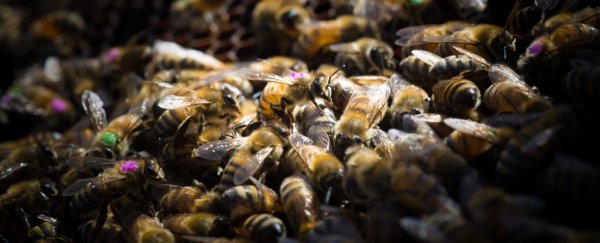Across the world, the buzz of bee colonies is growing faint, and hives are failing. In what's been described as "ecological armageddon", this vital pollinator is vanishing.
Scientists aren't entirely sure why. Strong evidence exists linking the decline to pesticides, but new research shows another poison – one long believed to be harmless to animals – may actually be indirectly killing bees.
A study by researchers from the University of Texas at Austin suggests the world's most widely used weed killer – glyphosate – could be a previously unknown factor behind what's known as colony collapse disorder.
Glyphosate is the active ingredient in Monsanto's best-selling Roundup – the self-proclaimed "flagship" of the company's agricultural chemicals business.
That's quite a business too: a 2016 study found that since its introduction in the 1970s, almost 10 million tonnes of glyphosate have been sprayed onto fields the world over.
That's a lot. Especially when this herbicide may be killing more than just herbs.
"We need better guidelines for glyphosate use, especially regarding bee exposure, because right now the guidelines assume bees are not harmed by the herbicide," says one of the researchers, biologist Erick Motta.
"Our study shows that's not true."
Glyphosate's mechanism of action as a herbicide is the disruption of an important enzyme found in plants and microorganisms, which is located in a metabolic structure called the shikimate pathway.
Animals don't have this pathway, which is why the chemical has long been thought to be non-toxic to them. But what about smaller organisms, such as the gut bacteria that populate the bee microbiome?
Contemporary science is basically an avalanche of studies revealing how gut bacteria and the microbiome generally are an essential and complex part of overall health.
In bees, it looks like the same holds true.
When the researchers exposed honey bees to glyphosate at levels equivalent to what's been found in crop fields, gardens, and roadsides, it significantly reduced their healthy gut microbiota.
In the experiments, half of the dominant healthy species of gut bacteria in the exposed bees – including Snodgrassella alvi, which help the insect process food and defend against pathogens – were found to be reduced.
 (Vivian Abagiu/University of Texas at Austin)
(Vivian Abagiu/University of Texas at Austin)
This reduction of good bacteria didn't end there: it actually impacted bee survival.
When untreated bees and glyphosate-exposed bees were exposed to the same bacterium – an opportunistic pathogen Serratia marcescens – the survival rates were starkly different.
Bees that hadn't been exposed to glyphosate saw their numbers halved after eight days with S. marcescens. But only one-tenth of the glyphosate-exposed bees survived the pathogen after the herbicide.
"Studies in humans, bees and other animals have shown that the gut microbiome is a stable community that resists infection by opportunistic invaders," says senior researcher and evolutionary biologist Nancy Moran.
"So if you disrupt the normal, stable community, you are more susceptible to this invasion of pathogens."
The pharmaceutical giant Bayer – which now owns Monsanto – issued a release in response to the research, claiming "[no] large-scale study has ever found a link between glyphosate and honey bee health issues" and that the new paper "does not change that".
That's predictable, but according to other researchers, it also might be missing the point.
"This study is part of a growing trend towards looking at more complex interactions between animals, their microbiome, and interacting stressors," explains evolutionary ecologist Andres Arce from Imperial College London, who wasn't involved with the research.
"Understanding these interactions is essential to quantify the hazards associated with pesticide use and is essential if we are to develop strategies that allow us to continue using pesticides, which are vital to modern agriculture, whilst minimising their effects on the natural world."
For now, more research is needed to better understand how glyphosate is affecting the bee microbiome – and the health of other creatures too – but the researchers say we should no longer think of this herbicide as being harmless to animals, even if it's only one factor of colony collapse disorder.
"It's not the only thing causing all these bee deaths," says Motta, "but it is definitely something people should worry about because glyphosate is used everywhere."
The findings are reported in PNAS.
